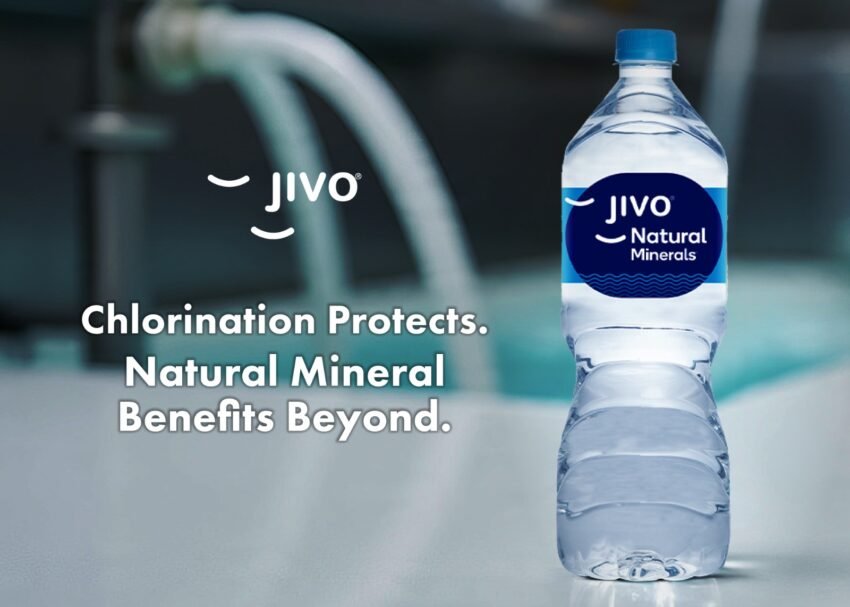Chlorination is the process of disinfecting water from harmful microorganisms such as bacteria, viruses, and other pathogens. Chlorination is performed to ensure safe drinking water is provided to the public and is done at large scale in water tanks, reservoirs, and municipal water treatment plants. This process of disinfecting water is not only carried out in India but is adopted globally to prevent waterborne diseases, and is mainly critical in municipal and storage systems to maintain water quality throughout distribution.
There is no doubt that chlorination keeps water safe, but does this process impact water quality and health? This concern does not apply to the best natural mineral water, as it is packed with essential minerals and does not undergo any chemical treatment. This means it supports overall wellness. As you read this blog, you will gain clarity on the process of chlorination, its impact on water, and why natural mineral water is the best choice for human consumption and hydration.
Understanding Chlorination and Its Process
Chlorination is a widely used method to purify water by adding chlorine, a powerful chemical that eliminates harmful germs. This process is critical for ensuring water is safe for drinking, especially in large-scale systems like municipal supplies. But how exactly does it work?
The process begins at water treatment facilities where raw water from sources like rivers, lakes, or groundwater is collected. Chlorine, either as a gas, liquid, or in compounds like sodium hypochlorite, is carefully added to the water. The chlorine targets bacteria, viruses, and other pathogens, neutralizing them to prevent waterborne illnesses like cholera or dysentery. The dosage is typically kept between 0.2 to 1 milligram per litre to balance safety and effectiveness. After chlorination, the water is held in tanks to allow the chlorine to fully disinfect before it’s tested and sent through pipes to homes and businesses.
This method is a lifesaver in preventing disease outbreaks, but it’s not without flaws. The chemical nature of chlorine can alter the water’s natural properties, which brings us to some of the challenges it poses. For those seeking cleaner, nutrient-rich options, best natural mineral water offers a compelling alternative, free from chemical treatments.
How Chlorination Affects Water
Chlorination is widely used to keep water safe by killing harmful germs. However, this chemical treatment can affect the quality of water in ways you might notice.
One common issue is the unpleasant taste and smell chlorine can leave behind. Many people describe chlorinated water as having a chemical or bleach-like flavour that can make drinking it less enjoyable. This taste comes from the chlorine itself and also from by-products called disinfection by-products (DBPs), which form when chlorine reacts with natural organic material in the water.
These changes in taste and smell can discourage people from drinking enough water or make them switch to less healthy beverages. Though chlorination does not significantly remove or harm important minerals like calcium or magnesium in water, these minerals contribute to the water’s natural flavour and benefits, which chlorinated water might lack.
In areas where groundwater naturally contains healthy minerals, heavy chlorination in municipal water supplies can detract from the pure, fresh quality many prefer. This is why more people are choosing natural mineral water, which preserves essential minerals and offers a clean, refreshing taste without chemical additives.
Choosing best natural mineral water supports better hydration and wellness by delivering minerals naturally, without the taste or smell issues linked to chlorinated tap water.
Health Impacts of Consuming Chlorinated Water
While chlorination makes water safe, it can have unintended health effects over time. The presence of chlorine and its by-products, like THMs (Trihalomethanes), in drinking water can lead to several concerns that might affect your daily life.
For starters, chlorinated water can irritate your skin and hair. After showers or baths, you might notice dryness, itchiness, or brittle hair due to chlorine stripping away natural oils. People who swim regularly often face “chlorine rash,” a red, uncomfortable irritation. For those with sensitive skin, this can be a recurring issue.
Internally, chlorinated water may disrupt your gut health. The chlorine can harm beneficial gut bacteria, which are crucial for digestion and immunity. This imbalance might cause bloating, irregular bowel movements, or weakened defenses against infections, particularly in children or older adults.
More concerning are the long-term risks. Research links prolonged exposure to THMs in chlorinated water to potential health issues, such as increased risks for bladder cancer or colon problems. While the risk is low, it accumulates over years of daily use. Pregnant women should be cautious, as some studies suggest possible effects on fetal development, including birth defects. Additionally, inhaling chlorine vapours from hot showers can irritate lungs, especially for those with asthma or respiratory conditions.
The taste and smell of chlorinated water can also discourage proper hydration. This is where best natural mineral water comes in as it’s free from these concerns, offering a pure, clean taste that encourages you to drink more.
Environmental Concerns of Chlorinated Water
Beyond health, chlorination has environmental implications. The process requires energy-intensive treatment plants, and the by-products of chlorination, like THMs, can end up in rivers and lakes when water is released back into the environment. These chemicals may harm aquatic life, disrupting ecosystems over time.
Moreover, the production and transport of chlorine for water treatment contribute to carbon emissions. In contrast, natural mineral water brands often source water from protected springs, reducing the need for chemical processing and heavy infrastructure. By choosing best mineral water in India, you’re not only prioritizing your health but also supporting more sustainable water practices.
Why Choose Natural Mineral Water Over Chlorinated Water?
Switching to natural mineral water is more than a trend—it’s a healthier, tastier choice. Sourced from underground springs or aquifers, best natural mineral water is naturally filtered by the earth, retaining vital minerals like calcium, magnesium, and bicarbonates. These nutrients are known to support bones and digestion, contributing to overall wellness.
Unlike chlorinated water, natural mineral water undergoes no chemical treatment and has a pleasant taste. Its crisp, clean flavour makes drinking water enjoyable, helping you stay hydrated without effort. This is especially important in hot climates like India, where dehydration is a common risk. Kids and adults alike prefer the smooth taste, reducing the temptation to reach for sugary drinks.
The minerals in best mineral water in India act as natural electrolytes, perfect sip after exercise or hectic activity. The alkaline nature of many natural waters can also ease acid reflux and promote a balanced body pH. Moreover, natural mineral water is free from chlorine by-products, making it the best solvent to quench thirst and support stomach, skin, and overall health.
From an environmental standpoint, the best natural mineral water brands prioritize eco-friendly bottling and sustainable sourcing, which phases out in case of chlorinated water systems. For those seeking pure, high-quality hydration, choose trusted natural mineral water companies like Jivo, the best option to go with.
Jivo Natural Mineral Water: A Premium Brand
When it comes to pure hydration, Jivo Natural Mineral Water stands out among the best natural mineral water brands in India. Sourced from pristine Himalayan springs, Jivo delivers quality natural mineral water with a perfect balance of minerals like calcium, magnesium, and sodium. Its natural pH of around 7.5 is slightly alkaline, supporting digestion and overall wellness.
Jivo’s commitment to purity ensures no chemical treatments, preserving the water’s natural goodness. It’s ideal for home, office, or travel. Whether you are at the gym, or fighting the hot summer season, Jivo offers a refreshing escape from chlorinated tap water. As one of the best mineral water in India, it combines great taste, essential minerals, and health benefits, making it a reliable hydrating solution.
Eco-conscious consumers will appreciate Jivo’s sustainable practices, from responsible sourcing to recyclable packaging. With every bottle, you’re choosing hydration that’s kind to both your body and the planet.
Practical Tips for Switching to Natural Mineral Water
Making the switch to best natural mineral water is easy with a few simple steps. Start by researching trusted natural mineral water brands, check labels for mineral content and source details. Keep a bottle handy at your desk, gym bag, or fridge to build a habit. For families, stock up on larger bottles to ensure everyone stays hydrated.
Test your tap water with a home kit to check chlorine levels if you’re curious about what you’re drinking. Gradually replace tap water with mineral-rich water from Jivo for cooking, drinking, and even your morning coffee as it enhances flavours naturally. By prioritizing best mineral water in India, you’ll feel the difference in energy, skin health, and overall vitality.
Go with the Best Mineral Water in India
Chlorinated water plays a vital role in keeping our water safe, but it may not be good for your health and environment. Prolong consumption of chlorinated water may have adverse health impact. Switching to natural and mineral-rich water for hydration is the wise way out. With brands like Jivo leading the way, you can enjoy pure, mineral-rich water that supports your health and tastes great.

